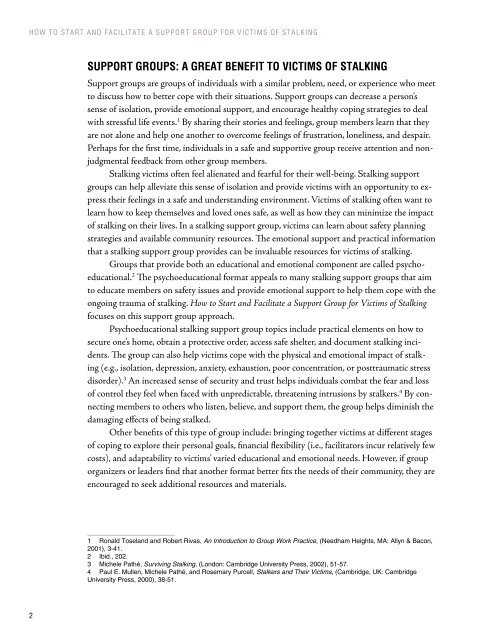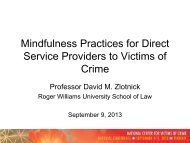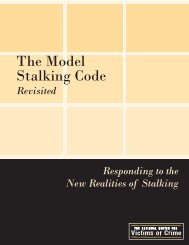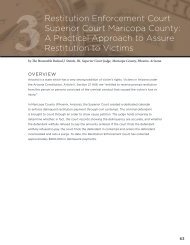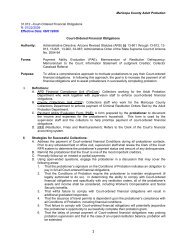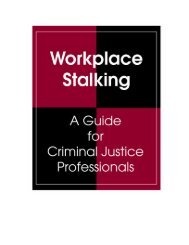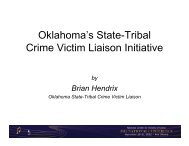How to Start and Facilitate a Support Group for Victims of Stalking
How to Start and Facilitate a Support Group for Victims of Stalking
How to Start and Facilitate a Support Group for Victims of Stalking
- No tags were found...
You also want an ePaper? Increase the reach of your titles
YUMPU automatically turns print PDFs into web optimized ePapers that Google loves.
<strong>How</strong> <strong>to</strong> <strong>Start</strong> <strong>and</strong> <strong>Facilitate</strong> a <strong>Support</strong> <strong>Group</strong> <strong>for</strong> <strong>Victims</strong> <strong>of</strong> <strong>Stalking</strong><strong>Support</strong> <strong>Group</strong>s: A Great Benefit <strong>to</strong> <strong>Victims</strong> <strong>of</strong> <strong>Stalking</strong><strong>Support</strong> groups are groups <strong>of</strong> individuals with a similar problem, need, or experience who meet<strong>to</strong> discuss how <strong>to</strong> better cope with their situations. <strong>Support</strong> groups can decrease a person’ssense <strong>of</strong> isolation, provide emotional support, <strong>and</strong> encourage healthy coping strategies <strong>to</strong> dealwith stressful life events. 1 By sharing their s<strong>to</strong>ries <strong>and</strong> feelings, group members learn that theyare not alone <strong>and</strong> help one another <strong>to</strong> overcome feelings <strong>of</strong> frustration, loneliness, <strong>and</strong> despair.Perhaps <strong>for</strong> the first time, individuals in a safe <strong>and</strong> supportive group receive attention <strong>and</strong> nonjudgmentalfeedback from other group members.<strong>Stalking</strong> victims <strong>of</strong>ten feel alienated <strong>and</strong> fearful <strong>for</strong> their well-being. <strong>Stalking</strong> supportgroups can help alleviate this sense <strong>of</strong> isolation <strong>and</strong> provide victims with an opportunity <strong>to</strong> expresstheir feelings in a safe <strong>and</strong> underst<strong>and</strong>ing environment. <strong>Victims</strong> <strong>of</strong> stalking <strong>of</strong>ten want <strong>to</strong>learn how <strong>to</strong> keep themselves <strong>and</strong> loved ones safe, as well as how they can minimize the impac<strong>to</strong>f stalking on their lives. In a stalking support group, victims can learn about safety planningstrategies <strong>and</strong> available community resources. The emotional support <strong>and</strong> practical in<strong>for</strong>mationthat a stalking support group provides can be invaluable resources <strong>for</strong> victims <strong>of</strong> stalking.<strong>Group</strong>s that provide both an educational <strong>and</strong> emotional component are called psychoeducational.2 The psychoeducational <strong>for</strong>mat appeals <strong>to</strong> many stalking support groups that aim<strong>to</strong> educate members on safety issues <strong>and</strong> provide emotional support <strong>to</strong> help them cope with theongoing trauma <strong>of</strong> stalking. <strong>How</strong> <strong>to</strong> <strong>Start</strong> <strong>and</strong> <strong>Facilitate</strong> a <strong>Support</strong> <strong>Group</strong> <strong>for</strong> <strong>Victims</strong> <strong>of</strong> <strong>Stalking</strong>focuses on this support group approach.Psychoeducational stalking support group <strong>to</strong>pics include practical elements on how <strong>to</strong>secure one’s home, obtain a protective order, access safe shelter, <strong>and</strong> document stalking incidents.The group can also help victims cope with the physical <strong>and</strong> emotional impact <strong>of</strong> stalking(e.g., isolation, depression, anxiety, exhaustion, poor concentration, or posttraumatic stressdisorder). 3 An increased sense <strong>of</strong> security <strong>and</strong> trust helps individuals combat the fear <strong>and</strong> loss<strong>of</strong> control they feel when faced with unpredictable, threatening intrusions by stalkers. 4 By connectingmembers <strong>to</strong> others who listen, believe, <strong>and</strong> support them, the group helps diminish thedamaging effects <strong>of</strong> being stalked.Other benefits <strong>of</strong> this type <strong>of</strong> group include: bringing <strong>to</strong>gether victims at different stages<strong>of</strong> coping <strong>to</strong> explore their personal goals, financial flexibility (i.e., facilita<strong>to</strong>rs incur relatively fewcosts), <strong>and</strong> adaptability <strong>to</strong> victims’ varied educational <strong>and</strong> emotional needs. <strong>How</strong>ever, if grouporganizers or leaders find that another <strong>for</strong>mat better fits the needs <strong>of</strong> their community, they areencouraged <strong>to</strong> seek additional resources <strong>and</strong> materials.1 Ronald Tosel<strong>and</strong> <strong>and</strong> Robert Rivas, An Introduction <strong>to</strong> <strong>Group</strong> Work Practice, (Needham Heights, MA: Allyn & Bacon,2001), 3-41.2 Ibid., 202.3 Michele Pathé, Surviving <strong>Stalking</strong>, (London: Cambridge University Press, 2002), 51-57.4 Paul E. Mullen, Michele Pathé, <strong>and</strong> Rosemary Purcell, Stalkers <strong>and</strong> Their <strong>Victims</strong>, (Cambridge, UK: CambridgeUniversity Press, 2000), 38-51.2


